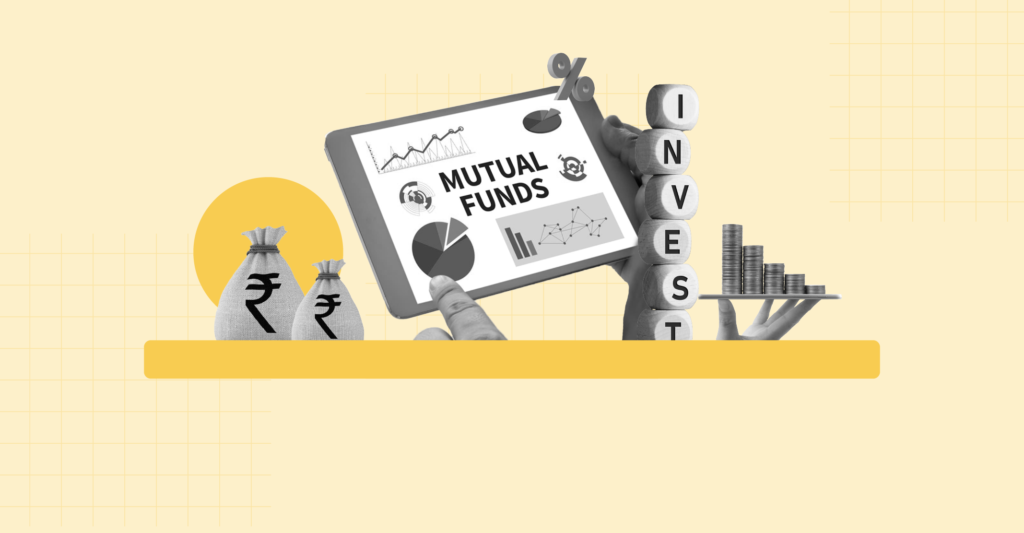Last Updated on Mar 28, 2025 by Aishika Banerjee
Everyone knows the benefits of mutual funds, but finding the right one from thousands of funds can be an overwhelming task, especially for beginners. Here in this article, we’ve listed the best mutual funds for beginners according to the different categories – equity, debt and hybrid.
Table of Contents
Best Mutual Funds for Beginners
Based on three different categories, we’ve listed the best mutual funds for each. The lists are derived using Tickertape’s Mutual Fund Screener.
Best Equity Mutual Fund for Beginners
| Name | Sub-Category | AUM (Rs. in cr.) | Expense Ratio (%) | CAGR 3Y (%) | CAGR 5Y (%) |
| Quant Small Cap Fund | Small Cap Fund | 26,330.82 | 0.64 | 29.95 | 48.45 |
| Bank of India Small Cap Fund | Small Cap Fund | 1,537.17 | 0.47 | 26.69 | 40.10 |
| Nippon India Small Cap Fund | Small Cap Fund | 61,646.36 | 0.68 | 30.43 | 37.68 |
| Quant Infrastructure Fund | Sectoral Fund – Infrastructure | 3,599.01 | 0.66 | 26.33 | 37.09 |
| Canara Rob Small Cap Fund | Small Cap Fund | 12,323.74 | 0.44 | 24.56 | 36.60 |
| Edelweiss Small Cap Fund | Small Cap Fund | 4,256.07 | 0.38 | 25.96 | 35.69 |
| Tata Small Cap Fund | Small Cap Fund | 9,463.78 | 0.34 | 28.15 | 35.10 |
| Motilal Oswal Midcap Fund | Mid Cap Fund | 20,055.68 | 0.57 | 37.39 | 34.85 |
| Quant Mid Cap Fund | Mid Cap Fund | 8,940.54 | 0.58 | 26.27 | 34.83 |
| Invesco India Smallcap Fund | Small Cap Fund | 5,352.82 | 0.41 | 28.72 | 34.66 |
Note: The information is dated 5th December 2024. The parameters used to filter the top 10 equity mutual funds in India for 2024 for beginners on the Tickertape Mutual Fund Screener are mentioned below.
- Category > Equity
- Plan: Growth
- 5-yr CAGR: Set from highest to lowest
Best Debt Mutual Funds for Beginners
| Name | Sub-Category | AUM (Rs. in cr.) | Expense Ratio (%) | CAGR 3Y (%) | CAGR 5Y (%) |
| Aditya Birla SL Medium Term Plan | Medium Duration Fund | 1,981.28 | 0.85 | 14.60 | 12.15 |
| Bank of India Credit Risk Fund | Credit Risk Fund | 114.92 | 1.03 | 40.02 | 10.85 |
| JM Low Duration Fund | Low Duration Fund | 231.17 | 0.31 | 6.42 | 9.62 |
| Aditya Birla SL Credit Risk Fund | Credit Risk Fund | 933.02 | 0.67 | 9.58 | 9.26 |
| UTI Dynamic Bond Fund | Dynamic Bond Fund | 554.96 | 0.67 | 9.12 | 9.15 |
| Baroda BNP Paribas Credit Risk Fund | Credit Risk Fund | 161.79 | 0.79 | 7.55 | 9.00 |
| Bank of India Short Term Income Fund | Short Duration Fund | 81.87 | 0.45 | 14.09 | 8.94 |
| DSP Credit Risk Fund | Credit Risk Fund | 188.05 | 0.40 | 11.64 | 8.83 |
| ICICI Pru All Seasons Bond Fund | Dynamic Bond Fund | 13,409.86 | 0.59 | 7.44 | 8.22 |
| ICICI Pru Gilt Fund | Gilt – Short & Mid Term Fund | 6,780.56 | 0.56 | 6.93 | 8.13 |
Note: The information is dated 5th December 2024. Below are the parameters used to filter the top 10 debt mutual funds in India for 2024 for beginners on the Tickertape Mutual Fund Screener.
- Category > Debt
- Plan: Growth
- 5-yr CAGR: Set from highest to lowest
Best Hybrid Mutual Funds for Beginners
| Name | Sub-Category | AUM (Rs. in cr.) | Expense Ratio (%) | CAGR 3Y (%) | CAGR 5Y (%) |
| Quant Multi Asset Fund | Multi Asset Allocation Fund | 3,025.56 | 0.62 | 23.97 | 29.74 |
| Bank of India Mid & Small Cap Equity & Debt Fund | Aggressive Hybrid Fund | 1,009.82 | 0.88 | 20.85 | 28.33 |
| JM Aggressive Hybrid Fund | Aggressive Hybrid Fund | 719.68 | 0.57 | 25.14 | 26.35 |
| Quant Absolute Fund | Aggressive Hybrid Fund | 2,250.71 | 0.70 | 16.51 | 25.52 |
| ICICI Pru Equity & Debt Fund | Aggressive Hybrid Fund | 40,203.38 | 0.98 | 21.01 | 22.76 |
| Mahindra Manulife Aggressive Hybrid Fund | Aggressive Hybrid Fund | 1,465.17 | 0.48 | 19.37 | 22.03 |
| ICICI Pru Multi-Asset Fund | Multi Asset Allocation Fund | 50,648.49 | 0.70 | 21.03 | 21.84 |
| HDFC Balanced Advantage Fund | Balanced Advantage Fund | 94,865.65 | 0.74 | 23.62 | 21.40 |
| Kotak Equity Hybrid Fund | Aggressive Hybrid Fund | 6,606.22 | 0.45 | 18.30 | 20.60 |
| Edelweiss Aggressive Hybrid Fund | Aggressive Hybrid Fund | 2,195.03 | 0.38 | 19.54 | 20.50 |
Note: The information is dated 5th December 2024. Below are the parameters used to filter the top 10 hybrid mutual funds in India for 2024 for beginners on the Tickertape Mutual Fund Screener.
- Category > Hybrid
- Plan: Growth
- 5-yr CAGR: Set from highest to lowest.

Understanding Mutual Funds
Mutual funds are financial instruments that pool money from multiple investors to invest in diversified portfolios of stocks, bonds, or other securities. They are managed by professional fund managers who aim to achieve specific investment objectives. For those new to investing, mutual funds offer an accessible and simplified way to participate in the financial markets.
How Do Mutual Funds Work?
- Pooling Money: Investors contribute capital by purchasing shares or units of the mutual fund. This creates a collective pool of money that the fund manager can invest.
- Investment Strategy: Fund managers use the pooled money to buy a variety of assets according to the fund’s investment strategy. For example, an equity mutual fund may invest primarily in stocks, while a bond fund focuses on fixed-income securities.
- Net Asset Value (NAV): The value of the mutual fund is determined by its NAV, which is calculated by dividing the total value of the fund’s assets minus liabilities by the number of outstanding shares. The NAV fluctuates daily based on the performance of the underlying investments.
Types of Mutual Funds
When exploring the top mutual funds or the best mutual funds to invest in, it is important to understand the different categories available. These funds cater to varying investment needs, risk levels, and financial goals.
1. Equity Mutual Funds
Equity mutual funds invest in stocks and are ideal for individuals aiming for long-term capital growth. Within this category, you can explore options such as long-term equity mutual funds, best equity mutual funds, or funds focusing on specific market segments like large-cap, mid-cap, and sectoral funds. These funds have the potential for higher returns on mutual funds over time but come with a higher risk due to stock market volatility. For those seeking the best mutual fund portfolio 2024, equity funds may play a significant role.
2. Debt Mutual Funds
Debt mutual funds focus on fixed-income instruments like bonds and treasury bills. They are designed for investors who prioritise stability and predictable mutual fund returns. As part of the mutual funds investment plans for beginners, debt funds are considered safer compared to equity funds. However, risks such as interest rate fluctuations and credit quality need to be considered. Many investors looking for top-performing mutual funds in India include debt funds in their portfolio for balance and diversification.
3. Hybrid Mutual Funds
Hybrid mutual funds combine equity and debt in their portfolio, offering a balanced approach to risk and reward. If you are searching for mutual funds to invest in 2024, hybrid funds may provide diversification with moderate risk. Depending on your goals, you can explore funds that lean more toward equity for growth or debt for stability. Hybrid funds are often part of the list of best mutual funds in India due to their flexibility and ability to cater to diverse investor needs.
4. Systematic Investment Plan (SIP) Mutual Funds
SIP is a method of investing that allows you to contribute small, regular amounts to mutual funds. Whether you’re exploring best sip plans in India or best investments for beginners, SIP mutual funds can be a suitable choice. This approach enables disciplined investing and benefits from rupee-cost averaging. SIPs are an accessible way for beginners to start their journey with India mutual funds and gradually build wealth over time.
5. Index Funds
Index funds are passive investment options designed to track market indices like the Nifty 50 or Sensex. These funds are often included in the top 10 best mutual funds for their simplicity, low cost, and alignment with market performance. Investors seeking low-maintenance strategies often consider top-performing mutual funds in the index fund category. However, it’s important to note that these funds only match the market’s performance and do not offer opportunities to outperform it.
6. International Funds
International funds invest in global markets, providing exposure to foreign equities or debt instruments. These funds can diversify your mutual fund portfolio and reduce dependence on domestic markets. However, risks like currency fluctuations and geopolitical issues may impact mutual fund returns. For investors looking for global diversification, these funds may be part of the best mutual funds in India 2024 for SIP or lump-sum investments.
By understanding the various types of mutual funds, you may find the best mutual funds for beginners in India or tailor your investments to achieve your specific financial goals.
How to Invest in Mutual Funds for Beginners in India?
You can make a lump sum investment in mutual funds or choose SIP for periodic investments. Once you’ve decided the way you want to invest and the fund, you can invest as per the ways below:
- Online or offline from the mutual fund house directly
- Through your broker
- Through AMFI registered agents
You can use Tickertape Mutual Fund Screener to find the best mutual funds in India. You can filter the funds based on your preferred parameters like AUM, NAV, 1-yr returns and more. You can also download the list of funds filtered as per your preferred parameters.
The best part is you can watchlist your favourite funds to monitor them regularly. Click to learn more about how to use Tickertape Mutual Fund Screener.
Taxation on Mutual Funds as per the 2024 Budget
Tax on Equity Mutual Funds
Short-Term Capital Gains (STCG)
If you hold equity mutual funds for less than a year, the gains from these investments are classified as short-term capital gains. According to the new budget, these gains are now taxed at a rate of 20%, which has been increased from the previous rate of 15%.
Long-Term Capital Gains (LTCG)
For equity mutual funds held for more than a year, the gains are considered long-term capital gains. The key points to note under the new budget are:
- Tax-Free Limit: Gains up to Rs. 1.25 lakh in a financial year remain tax-free. This limit has been increased from the previous threshold of Rs. 1 lakh.
- Tax Rate: Any gains above Rs. 1.25 lakh are taxed at a flat rate of 12.5%. It was previously taxed at 10%.
- Indexation: It’s important to note that the benefit of indexation, which previously allowed investors to adjust the purchase price of their assets for inflation, has been removed for all asset classes, including equity mutual funds.
Indexation is a method used to adjust the purchase price of an asset (like property or gold) for inflation over the years. This adjusted price is then used to calculate capital gains. Previously, long-term capital gains from selling property, gold, or other unlisted assets were taxed at 20%, but you could use indexation to reduce your taxable profit. The new rule simplifies the tax structure by setting a flat 12.5% tax rate for all long-term capital gains. However, it removes the indexation benefit.
Summary
| Capital Gains Tax | Holding Period | Old Rate | New Rate |
| Short-Term Capital Gains (STCG) | Less than 12 months | 15% | 20% |
| Long-Term Capital Gains (LTCG) | More than 12 months | 10% | 12.50% |
Tax on Debt Funds
Short-Term Capital Gains (STCG)
If you sell your debt fund units within three years (36 months), the gains from these investments are considered short-term capital gains. According to the new budget, these gains will be taxed according to your income tax slab rate.
Long-Term Capital Gains (LTCG)
For debt funds held for over three years (36 months), the gains are categorized as long-term capital gains. The key points to note under the new budget are:
- Tax Rate: The tax rate for long-term capital gains on debt funds is now a flat 12.5%, regardless of the amount of gain.
- No Indexation Benefit
Summary
| Capital Gains Tax | Description |
| Short-Term Capital Gains (STCG) | If you sell your debt fund units within three years (36 months), the tax will be as per your income tax slab. |
| Long-Term Capital Gains (LTCG) | For debt funds held for over three years (36 months), the tax rate is now a flat 12.5% without indexation benefits. |
Tax on Hybrid Funds
Short-Term Capital Gains (STCG)
For hybrid mutual funds, the tax treatment of short-term capital gains depends on the asset allocation of the fund:
- Equity-Oriented Hybrid Funds (more than 65% in equity): If you sell units within one year, the gains are considered short-term and taxed at 20%.
- Debt-Oriented Hybrid Funds (less than 65% in equity): If you sell units within three years, the gains are considered short-term and taxed according to your income tax slab.
Long-Term Capital Gains (LTCG)
For hybrid mutual funds held beyond the specified holding periods, the tax treatment is as follows:
- Equity-Oriented Hybrid Funds (more than 65% in equity): Gains from units held for more than one year are considered long-term. These gains are taxed at a flat rate of 12.5%, with gains up to Rs. 1.25 lakh being tax-free.
- Debt-Oriented Hybrid Funds (less than 65% in equity): Gains from units held for more than three years are considered long-term and are now taxed at a flat rate of 12.5% without indexation benefits.
Summary
| Type of Fund | Short-Term Capital Gains (STCG) | Long-Term Capital Gains (LTCG) | Indexation Benefit |
| Equity-Oriented Hybrid Funds | 20% for holdings less than 1 year | 12.5% for holdings over 1 year, with gains up to Rs. 1.25 lakh tax-free | Not available |
| Debt-Oriented Hybrid Funds | Taxed as per income tax slab for holdings less than 3 years | 12.5% for holdings over 3 years | Not available |
Why should you invest in mutual funds?
Mutual funds are managed by fund managers who invest your money into different asset classes for profits. The reasons you need to invest in mutual funds are below:
- Start little: Mutual funds provide an opportunity to invest with less investment, starting at Rs. 100 at regular intervals. This can even establish a disciplined approach in you.
- Diversified: As the investment is made in different instruments, the investment is diversified. Hence, even if one asset doesn’t perform well, there can be other options in the fund to compensate for the loss.
- Quick and simple: You can invest in mutual funds online quickly with simple steps.
Benefits of Investing in Mutual Funds for Beginners
- Professional Management: Mutual funds are managed by experienced professionals who make investment decisions on your behalf, making it easier for beginners to participate in markets.
- Diversification: By investing in mutual funds, you can spread your investments across various asset classes, reducing the impact of individual stock or sector performance.
- Accessibility: You can start investing with small amounts through SIPs, making mutual funds accessible to investors with limited capital.
- Flexibility: Mutual funds offer a variety of schemes, such as equity, debt, and hybrid funds, catering to different risk appetites and investment horizons.
- Liquidity: Most mutual funds provide high liquidity, allowing you to redeem your investment at any time, subject to exit load and applicable taxes.
Risks and Challenges of Investing in Mutual Funds for Beginners
- Market Risk: The returns of mutual funds are not guaranteed and depend on market performance. Market volatility can affect the value of your investments.
- Expense Ratios: Each mutual fund charges a management fee, known as the expense ratio. Higher expense ratios can reduce your overall returns.
- Lack of Control: As mutual funds are managed by professionals, you may have limited control over the individual securities in the portfolio.
- Misalignment of Goals: Selecting the wrong mutual fund without understanding its objective can lead to underwhelming performance relative to your financial goals.
Important Factors to Know While Investing in Mutual Funds
Though mutual funds can provide good returns with a diversified option, there are certain factors you need to consider before investing.
Understand the Types of Mutual Funds
There are several types of mutual funds available that are categorised based on their portfolio composition and risk. You need to pick the best mutual fund for beginners or advanced investors based on your investment goals and risk tolerance. For instance, long term equity mutual funds can be a great choice for those with a higher risk appetite and a long-term horizon. Beginners often ask, “Which mutual fund is best for beginners?” The answer depends on your goals, whether it’s a best fund to invest in 2025 or a best SIP for beginners.
Align Your Investment Goals with Mutual Funds
While investing in mutual funds, keep your long-term and short-term goals in mind and find the fund accordingly. Mutual funds for beginners in India, for example, might focus on stable, lower-risk options. It’s also crucial to consider mutual fund performance as a factor in your decision. Researching top performing mutual funds in India can help identify funds that consistently deliver good returns.
Evaluate Mutual Fund Performance
It is important to check the fund’s performance before investing. However, you also must remember that the fund may not perform the same way yearly. To ensure success, you may explore how to invest in mutual funds for beginners and evaluate the top-performing mutual funds across different periods.
Avoid Over-Diversification
Ensure your fund is not over-diversified, as it can dilute your profits. The best MF for SIP 2024 or the best fund to invest in 2025 should align with your financial strategy. Always consider your priorities, whether it’s investing in the best MF to invest now or finding the best MF for beginners to start your journey.
Investing in mutual funds can be a rewarding journey if approached strategically. By understanding the types of mutual funds, aligning your goals, and evaluating the mutual fund performance, you can make informed decisions to achieve your financial objectives.
Conclusion
Mutual funds can be a good investment option only when you understand the workings of the fund. Ensure it aligns with your investment objective. You can do your research or contact a financial advisor before investing.
FAQs
Can NRIs invest in mutual funds in India?
Yes. NRIs are allowed to invest in mutual funds in India. However, you can check the scheme’s terms and conditions before investing.
How much money can I invest in mutual funds?
There is no maximum limit to investing in mutual funds. But pick a fund according to your investment goal, risk appetite and fund performance. Also, ensure you have left some money for emergency funds.
Do we need a Demat account to invest in mutual funds?
No. Having a Demat account to invest in mutual funds is not mandatory. However, you must complete your KYC with the AMC (Asset Management Company) you are picking to invest in mutual funds. The KYC includes the basic details of an investor.
Can I withdraw mutual funds anytime?
Yes, you can generally withdraw money from mutual funds at any time, especially if you are invested in open-end schemes. However, keep in mind that some specific types of mutual funds, like Equity Linked Savings Schemes (ELSS), have a mandatory lock-in period of three years before you can withdraw your investment.
Can I start investing in mutual funds with a small amount of money?
Absolutely! Mutual funds are accessible to investors with varying budgets. Many mutual funds allow you to start investing with a relatively small amount, often as low as ₹500, through Systematic Investment Plans (SIPs). This makes it easy for individuals to begin their investment journey without needing substantial capital upfront.




